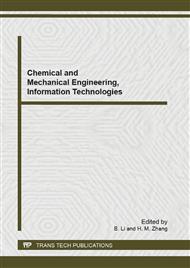p.1845
p.1850
p.1854
p.1858
p.1863
p.1867
p.1872
p.1876
p.1880
Temperature Compensation Technique in Cable Tension Sensor Based on Magneto-Elastic Effect
Abstract:
Magneto-elastic cable tension sensor have a number of advantages, it will be ideal method to measure cable tension in large span cable-bridge, but the sensor is sensitive to temperature, so the temperature influence is not negligible to sensor. In this paper, the principle of cable tension sensor based on magnetic-elastic effect is introduced, the common temperature compensation technique are detail analyzed. A novel method of temperature compensation by adjusting the bias magnetic field is put forward, by theoretical analysis and experiment, indicated that it is feasible to compensated the temperature influence.
Info:
Periodical:
Pages:
1863-1866
Citation:
Online since:
September 2013
Authors:
Price:
Сopyright:
© 2013 Trans Tech Publications Ltd. All Rights Reserved
Share:
Citation:


